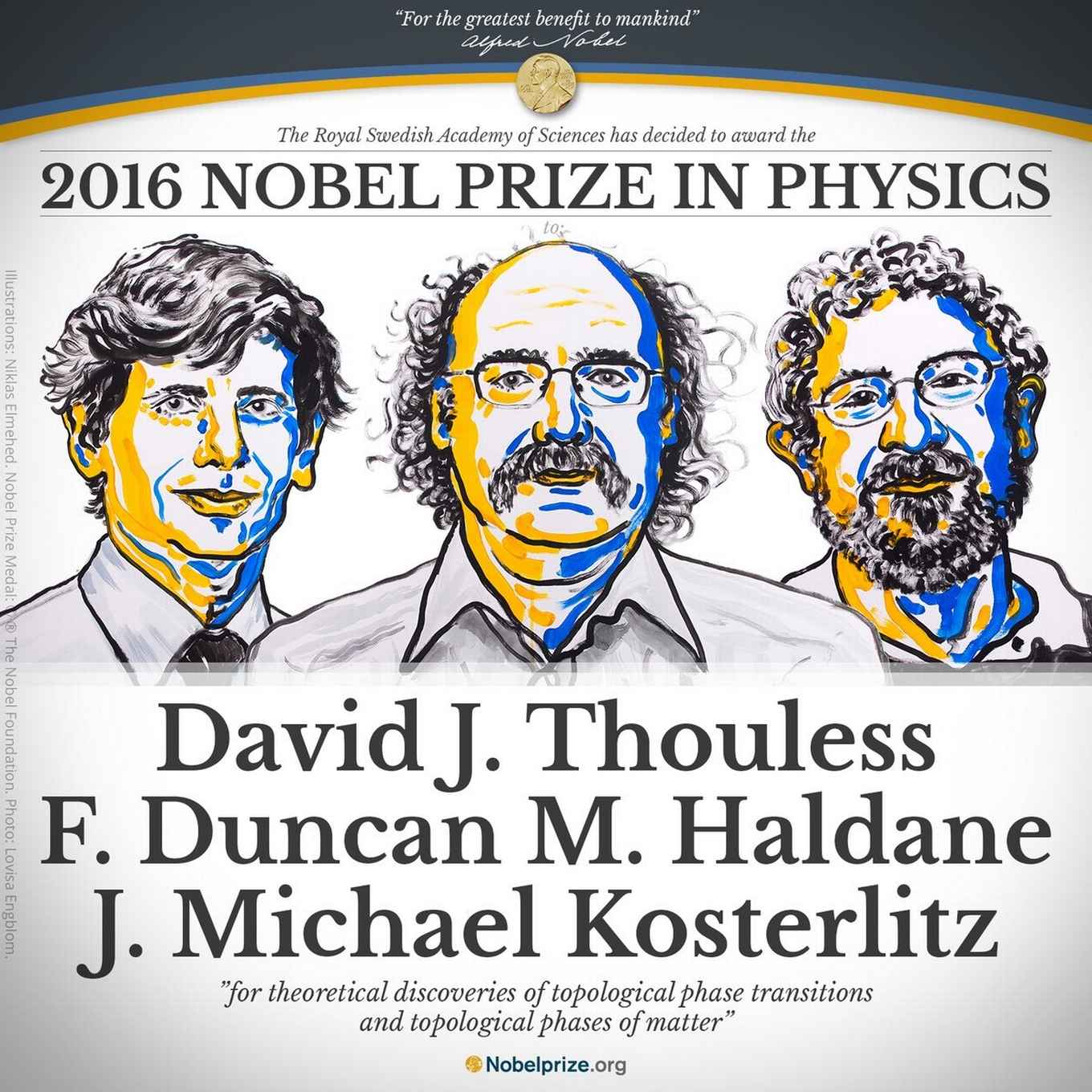Nobel Prize in Physics for topological phase transitions
5 October 2016

The three physicists investigated unusual phase transitions, which differ from the traditional phase transitions from gas, to liquid and solid. These so-called topological phase transitions play a role in unusual phenomena such as superconductivity and superfluidity.
Kosterlitz and Thouless did the research they have been awarded the Nobel Prize for in the early 1970s. Their work built further upon the theories of scientists such as Lev Landau and Richard Feynmann about superconductivity and superfluidity. At the time these phenomena were considered to be three-dimensional phenomena: the existing theories could not adequately explain these phenomena in ultrathin layers. Using advanced mathematical methods, Kosterlitz and Thouless demonstrated that superfluity and later superconductivity can certainly occur in thin layers. They explained superconductivity in thin films with a phase transition in which pairs of vortices arise in the layers. This also explained why this phenomenon disappears at high temperatures. Later in the 1980s Haldane built further on this work. He also used topology to explain, for example, how chains of magnetic atoms can be found in some materials. Cristiane de Morais Smith (Utrecht University) is working together with Haldane on a project into the interaction between topological insulators: "He has an insightful way of approaching a problem. We have been working together in a project since November. If somebody deserves the prize then it is definitely him. He is a visionary and he has a deep understanding of physics."
The Brit Nigel Hussey, director of the magnet laboratory HFML in Nijmegen: "Yes, they deserve the prize. I am pleased that all three of them are British even though they work in the United States. They are the godfathers of topology in the physics of condensed matter. The subjects of their research – superconductivity, topology and magnetism – are subjects that we are still working on daily in our laboratory."
Hans Mooij, who works at Delft University of Technology on superconducting qubits and wires, says that the award is not a surprise: "For Thouless, in particular, I have been expecting it for a very long time. He is a veritable theoretician. He can be regarded as the founding father of mesoscopic physics."
Physicist Erik van Heumen from the University of Amsterdam: "I am pleased that the Nobel Prize is being awarded for this subject. I do research on superconductivity in layered systems and into high-temperature superconductivity and I work with the theories from these three luminaries on a daily basis. Many hot subjects in physics, such as topological insulators, have their roots in their work. The award is entirely justified and it is fantastic that on this occasion the Nobel Prize has gone to this type of extremely difficult mathematics."
All the physicists hope that this Nobel Prize will be the stepping stone for a second Nobel Prize for the discipline, for example for topological insulators. Thouless receives half of the prize and Haldane and Kosterlitz share the other half. In keeping with tradition, the prize will be awarded on 10 December, the anniversary of Alfred Nobel's death.
Evening of the Nobel Prizes
On Friday 7 October the Royal Netherlands Academy of Arts and Sciences is organising the Evening of the Nobel Prizes. During this meeting the research that has been awarded the prizes this year (physics, chemistry, medicine and literature) will be explained. The meeting will be held at the Openbare Bibliotheek (public library) Amsterdam.
Further reading
English
Science: Trio snare physics Nobel for describing exotic states of matter
Nature: Physics of 2D exotic matter wins Nobel
Website of the Nobel Prizes 2016 Nobel Prizes 2016 see the website.
Dutch